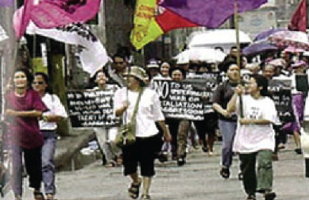
Mainstreaming Gender and Development (GAD) in the LGU of Davao City
Davao City
2004
Of Davao City’s population of 1.15 million as of 2002, more than half is female. Gender ratio is 99 males per 100 females. By their sheer number, women contribute significantly to the city’s development. Yet, for a long time, this contribution had hardly been recognized, and myriads of women issues had not been adequately addressed.
Political upheavals during 20 years of President Marcos’s strongman rule greatly raised people’s awareness of women’s role in society and of women issues. The struggle against dictatorship created a strong women’s movement in Davao City. By the time Marcos fell from power, a lot of women’s groups had been strongly put in place to pursue advocacy of women’s rights and welfare through gender mainstreaming.
In 1986, two women were appointed members of the city council, the first in the city’s history. The late 1980s also saw more efforts toward empowerment of women through grassroots organizing, paralegal training, and recognition of “women’s rights as human rights.”
The early 1990s were a time for advancing women’s agenda. Women’s groups worked to formulate legislative measures, seek sectoral representation, form study groups to draft the Women’s Code, conduct research and gather sex-disaggregated data on the women situation, and elect more women in the city council.
The late 1990s and early 2000s saw the flowering of gender and development (GAD) mainstreaming efforts. In September 1997 the city council passed the Women Development Code. The following year, Mayor Benjamin de Guzman issued Executive Order No. 24 approving the Code’s implementing rules and regulations (IRR). Among IRR’s features was the creation of Integrated Gender and Development Division (IGDD) under the city government to oversee the implementation of the Code and to act as a coordinative, regulatory and monitoring body.
Other GAD mainstreaming measures included creation of the Davao Medical Center (DMC) and the inter-agency Violence Against Women Council (VAWC). The DMC put up the Women and Children Protection Unit (WCPU), a one-stop family crisis intervention center, and the Birthing Home program to promote healthy pregnancy through quality home-setting delivery. The VAWC signed a memorandum of agreement with the city government to install a 24-hour hotline at the Women and Children’s Desk of the city’s police station.
Other institutions put up to address women issues were the Child Minding Center, a day-care center for LGU employees; Bathaluman Crisis Center Foundation, a NGO which provides direct services to women victims of violence; and the Womynet, an advisory center for rape, incest, child abuse, and violence against women.
At the barangay level, GAD mainstreaming took the form of Gender Sensitivity Training (GST) and Gender Policy Planning (GPP), in which council members, health workers, nutrition scholars, village police, and purok leaders from 37 barangays participated in.
Women’s Summit, a consultative assembly of barangay women’s organizations and sectoral organizations, is held annually to formulate a women’s agenda. Five summits had been held.
In many ways, Davao City had been much ahead of others in GAD mainstreaming. It was the first to legislate a development code for women. It had a mechanism for electing women representatives in the city council. It had a permanent office, created by law, dedicated to GAD mainstreaming. It had mandated public funds for GAD programs (at least 6% of agricultural development fund, 30% of official development assistance fund, and 5% of general fund). It was the birthplace of the Mindanao Commission on Women. It had the first Women Correctional Institute in Mindanao. It had the first landmark case on marital rape. Its city council does not approve budget without GAD plan.
Other regions are consulting Davao City for evaluation of their own GAD plans. Other cities and municipalities are conducting study tours to observe the city’s implementation of GAD mainstreaming. Japan and Indonesia are studying the city’s GAD mainstreaming for replication.
GAD mainstreaming is another jewel in Davao City’s crown as a leading Philippine local government unit.
This program is recognized as one of the Ten Outstanding Programs in the 2004 Galing Pook Awards.


